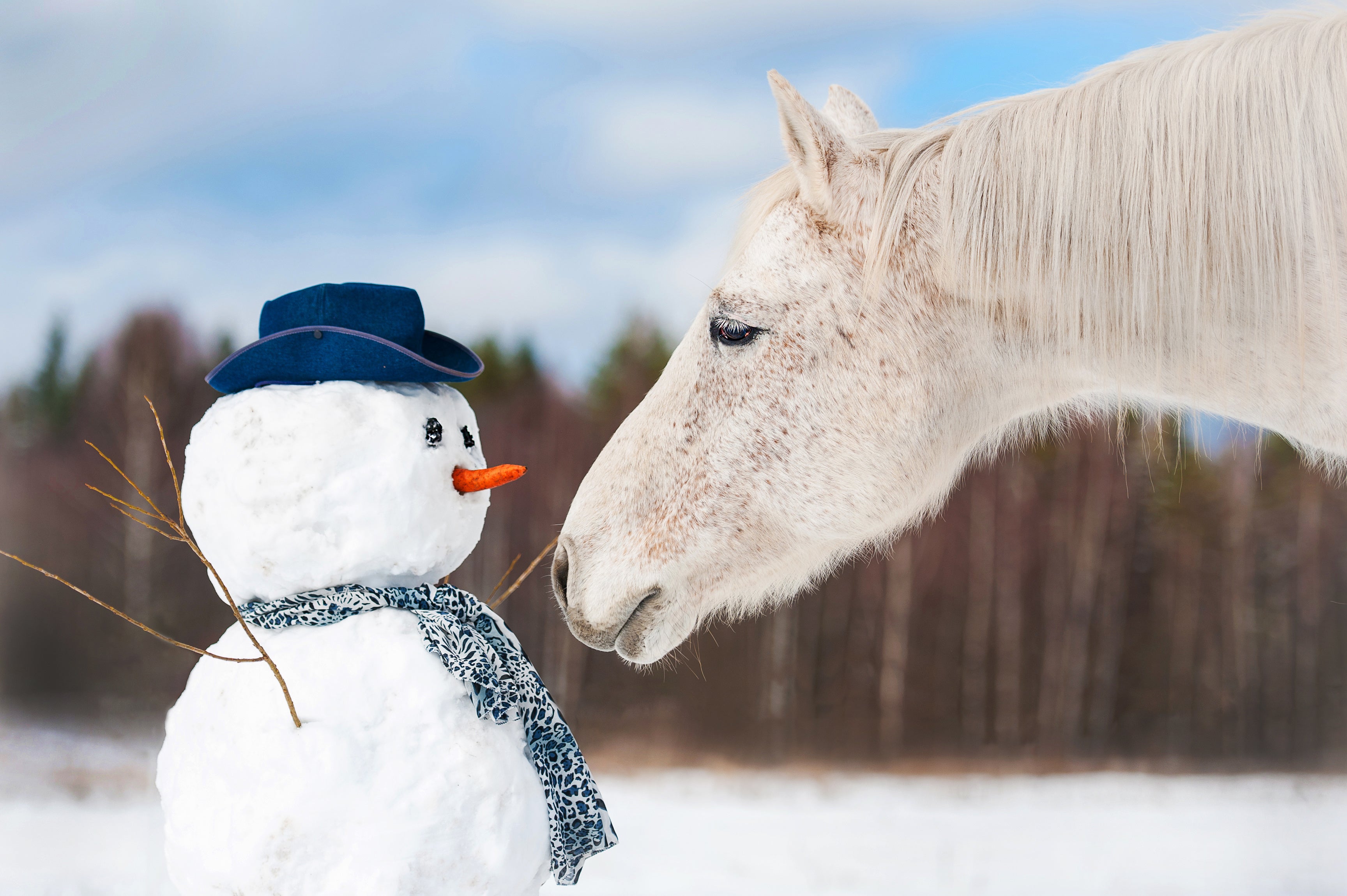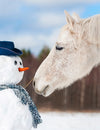
Caring for Your Horse in the Winter
When caring for your horse in the winter, it’s important to ensure your horse has everything it
needs to survive the winter elements. Just because they have a protective covering of hair doesn’t
mean that they don’t suffer from the cold and wind. Winter horse care entails providing your
equine friend with adequate horse blankets, food, water, and hay.
Horses can be comfortable outside in the winter, but there are a few things they need from you to
stay warm and happy. These include:
• Feed modifications
• Mud and ice management
• Shelter from the elements
• Blanketing
• Watering
• Hay
• Companionship
Tips for keeping your horse happy during winter:
Here are some helpful winter horse care tips to help your equine friend stay comfortable this
winter!
Blanketing
Get them winter ready
Keep them covered! Horses get cold in winter, just like us.
Insulate
Consider blanketing when it’s wet, windy, and cold.
When a wet coat loses its loft, it won’t hold in your horse’s body heat. Instead, the wind blows
the warmth away.
… but don’t overdo it
While you want to keep your horse cozy during cold nights, make sure you don’t overheat your
horse.
Note that a horse will feel cold to your touch. However, the horse's coat and body heat insulate
the horse, directing the warmth into the horse. Follow the blanket manufacturer’s guidelines.
Some experts even recommend only using blankets for horses with special needs such as horse
who are:
• Clipped
• Old
• Sick
• Thin
• Rescued
• Cold by nature
• Without shelter
• In really cold weather
• They’re already accustomed to wearing a blanket
Also, if you already use a blanket, don’t discontinue use. Your horse adapts its temperature
regulation when it has gotten used to wearing a blanket. If it’s in equilibrium, don’t change it!
Also use common sense. If there’s snow and ice, give your horse a blanket and bring the horse
indoors. When in doubt, consult your veterinarian with any questions or concerns regarding your
horse's health.
Note: Make sure to regularly re-waterproof your blanket or rug, so it continues to keep your
horse warm and dry.
Does the blanket fit the condition?
If you use horse blankets, use the appropriate blankets according to weather conditions. Horse
blankets, also called rugs, come in different weights.
The three main types of horse blankets include:
• Stable blankets
• Turnout blankets
• Sheets
Stable Blankets
Stable blankets are lightweight, but not waterproof, and keep the winter chill at bay. Stable
blankets are ideal for a clipped horse in their stable during the winter or horses that housed in a
heated barn. If you live in a warmer climate, stable blankets are perfect for keeping your equine
friend comfortable on a cool night.
Turnout blankets
If it’s colder and you need a blanket that’s waterproof, turnout blankets will suit your purpose.
Turnout blankets’ tougher fabrics provide more substantial insulation and keep the rain out.
Horse sheets
Unless it’s mild out, horse sheets aren’t designed for winter. A lightweight cover, they’ll keep
your horse clean after grooming, which could be important right before a show!
Regularly check underneath horse blankets
If your horse wears a winter blanket/rug, remove it daily to check for chaffing and irritation. If
the blanket is rubbing or chaffing, try a different blanket or have the blanket altered. Inserting a
shoulder guard underneath the blanket might also stop the blanket from rubbing.
Grooming
Grooming your horse daily becomes even more important when it regularly wears a blanket.
Grooming keeps their coats cleaner and your horse more comfortable.
Blanketing tips:
• Make sure your horse is clean and dry before blanketing them.
• Make sure your blanket suits its purpose. A stable blanket is great for a stable but it’s not
waterproof. A horse walking in the pasture shouldn’t be wearing a stable blanket. A
turnout blanket is a waterproof blanket used during turnout. A blanket that isn't
waterproof will become saturated and your horse will quickly become cold.
• Use different horse blankets for different weather conditions. If it's 40 degrees your horse
can wear a lightweight blanket; however, if it's 10 degrees a heavy-weight blanket is in
order. When the weather becomes warm, remove the blanket so your horse doesn’t sweat,
which can be just as bad as keeping your horse in a wet blanket when it rains.
• Make sure your horse blankets, straps, and surcingles fit your horse.
• Check your horse at least twice daily for rubs and sores from the blanket. Make sure
straps and surcingles are still safely and securely in place.
• Repair any rips in the blanket ASAP.
• Remove your horse's blanket so you can continue to groom it regularly, just as you would
every other time of year.
• When removing the blanket to complete some of these tasks, fluff up your horse's hair so
that the hair can insulate properly.
Blanket selection
Many horse owners blanket their horses during winter to help keep them warm. The Wire Horse
has a wide selection of horse blankets. Take a look!
WATER
Keep them watered!
When it comes to caring for your horse in the winter, water is essential. Make sure that their
water is replenished and in an area where it won’t freeze.
Why water is so important
Impaction colic – pain caused by food blocking the GI tract – increases in winter because horses
don’t drink enough water and hay contains less moisture than grass. Horses also can’t digest hay
if they’re dehydrated. Dehydration can even cause death.
Think rubber
Horses must always have clean water available to them. Rubber buckets are recommended for
winter because, compared to plastic buckets, it’s easier to knock the ice out of them should they
become frozen. If plastic buckets with water freeze they can shatter. Rubber buckets have a
higher up-front cost but last longer. Consider hanging up the bucket to keep it away from food,
bedding, manure, and debris. Bucket heaters are another way to ensure the drinking water
doesn’t freeze. Scrub containers with a bristle brush and vinegar and rinse.
It’s automatic
Automatic waterers are another option. Check and secure the cords of heated water buckets and
troughs. Check them twice daily to ensure they are clean and functioning, and refill regularly.
It’s not unusual for horses to get manure in buckets and waterers.
Safe tanks
Safe tanks are yet another option. Just make sure to keep it hygienic.
Test natural water
If a bank by a pond becomes too slippery, fence off the area so that the horse doesn’t fall. If the
water is still safe to access, still make sure to check the water quality. Heavy rain and spring
runoff might affect it and horses can’t always differentiate between safe and unsafe water. Your
local health unit or agricultural extension can advise you on how to test the water.
How much water is enough?
Horses typically drink less water in winter, but it’s essential to drink a certain amount. Horses
typically consume/need 2-3kg of water per each kg dry feed.
Water consumption by horse weight*
Body weight (lbs) Water (L/day)
500 lbs 13-20 L/day
1,000 lbs 26-39 L/day
1,500 lbs 39-59 L/day
*Information from the Ontario Ministry of Agriculture, Food and Rural Affairs, 2016.
That’s encouraging!
Water that isn’t chilly encourages horses to drink. In fact, horses prefer water that is slightly
warm during the winter. Water should be de-iced with an automatic de-icer or manually.
Water and salt
Continue providing access to a trace mineral salt block to increase water consumption.
HAY
Fresh hay
Keep their hay fresh! Fresh hay is both good to eat and acts as a great insulator.
Use high-quality hay
Since your horse’s staple food grass is unavailable, use high-quality hay as the bulk of your horse’s feed.
Supplement the hay
Optionally supplement the hay with high-fiber foods like sugar beets and alfalfa.
Older horses with poor teeth might struggle with certain foods. Try haylage or soak hay cubes to
make them easier to chew.
Add vitamin or mineral supplements to your horse’s feed. This will provide nutrition without the
calories. Consult your veterinarian for specifics.
Winter feed modifications
Most horses need to consume 2% of their body weight per day. The bulk of your horse's diet
should come from grass or hay.
A 1,000-pound horse with a diet of primarily hay should typically consume 20 pounds of hay per
day. In winter weather your horse will need to consume an additional 25 to 30 pounds of hay per
day to keep warm. Consult your veterinarian, nutritionist, or feed specialist for specifics.
Fiber digestion is what keeps your horse warm. The extra 25 to 30 pounds of forage will allow
your horse to produce body heat from digestion.
Low-nutrient grass hay will provide forage for your horse’s consumption but without the excess
calories. For older horses immature/tender/nutrient-rich hay is best. Older horses benefit most
from alfalfa hay since it contains more calories than grass hay.
Don’t overfeed your horse
Moderation is key. ’Nuff said.
More winter horse care tips:
• Adjust the content of your feeding depending on how the horses diet changes due to a
lack of grass
• Add minerals to your horse’s diet if you don’t already
• Help your horses keep warm with a generous supply of hay
• Don’t overfeed your horse though!
• Have teeth checked
• Provide shelter for overnight and during the day
• Prevent snowballs from forming in your horse’s hooves
• Continue deworming
• Keep hooves well taken care of
• Manage the mud!
• Allow your horse plenty of time outdoors
• Ensure adequate ventilation in the stable or shelter
• Be aware of winter ailments, including respiratory illnesses and skin conditions
A note on companionship
Winter horse care involves providing for your horse’s physical needs; but, your horse’s
emotional well-being is just as important. Horses are herd animals. They enjoy spending time
with other horses and they enjoy spending time with you. Even when the weather is too awful for
riding, keep a regular grooming schedule and then just visit with your horse. Your equine friend
will appreciate it!
Contact us!
Caring for your horse in the winter? The Wire Horse offers all of the quality winter horse care
products you need to keep your horse comfortable and be able to thrive during winter. Our staff
provides expert advice on all your equine needs! Contact Us with any questions you may have
about caring for your horse this winter.
WINTER HORSE CARE SHOPPING
For winter horse blankets:
Keep your horse warm this winter.
https://www.thewirehorse.com/stable-supplies/winter- blankets
For straps:
Ensure your horse’s blanket is a great fit.
https://www.thewirehorse.com/horse-tack/misc- strap-goods
For food supplements:
Augment your horse’s diet for winter weather.
https://www.thewirehorse.com/stable-supplies/supplements
For grooming supplies:
Keep your horse comfortable and feeling loved.
https://www.thewirehorse.com/stable-supplies/grooming- supplies/brushes-and- curry-combs
Links:
https://www.thewirehorse.com/
http://www.thehorse.com/articles/30899/winter-horse- care-tips- for-owners
https://www.wikihow.com/Care-for- Your-Horse- In-the- Winter
https://www.thespruce.com/winter-horse- and-pony- care-tips- 1887259
https://www.thespruce.com/importance-of- turnout-for- your-horse- 1886932
https://www.thewirehorse.com/saxon-600d- standard-neck- medium-weight- turnout-blanket-
43522
https://www.thespruce.com/water-for- your-horse- 1885962
http://www.omafra.gov.on.ca/english/engineer/facts/07-023.htm#4
https://www.smartpakequine.com/content/impaction-colic- horse
http://www.drsfostersmith.com/pic/article.cfm?articleid=1812
https://www.extension.umn.edu/agriculture/horse/care/cleaning-water- and-tanks/
Leave a comment




